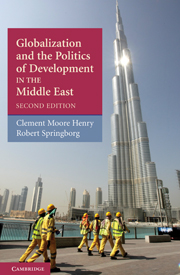Book contents
- Frontmatter
- Contents
- Figures
- Tables
- Preface to the second edition
- Preface and acknowledgments
- Glossary
- Map The Middle East and North Africa
- 1 The globalization dialectic
- 2 The challenges of globalization
- 3 Political capacities and local capital
- 4 Bunker states
- 5 Bully praetorian states
- 6 Globalizing monarchies
- 7 Precarious democracies
- 8 Conclusion
- References
- Index
2 - The challenges of globalization
Published online by Cambridge University Press: 05 June 2012
- Frontmatter
- Contents
- Figures
- Tables
- Preface to the second edition
- Preface and acknowledgments
- Glossary
- Map The Middle East and North Africa
- 1 The globalization dialectic
- 2 The challenges of globalization
- 3 Political capacities and local capital
- 4 Bunker states
- 5 Bully praetorian states
- 6 Globalizing monarchies
- 7 Precarious democracies
- 8 Conclusion
- References
- Index
Summary
The MENA, which hesitated more than any other region of the world to adopt the reforms needed to benefit from the new international division of labor, has progressed considerably since the 1990s in adopting the neoliberal principles of the Washington Consensus as its basis for formulating national economic policies. Global changes are breaking the cocoon that had once protected the region from major structural changes. This chapter first views the degrees to which the region has engaged in the globalization dialectic, and then goes on to analyze the continuing international and regional incentives and counter pressures. Although the MENA continues to attract a disproportionate share of attention from external powers and to receive abundant petroleum as well as strategic rents, the financial flows no longer insulate it from the need to reform. Rapid economic growth is needed to meet the region's spectacular gift and challenge: the youth bulge of record numbers reflecting major demographic changes (Fuller 2004). Although many states such as Algeria, Iran, and Turkey dramatically reduced their birth rates in the 1990s, their baby booms of the 1980s keep enlarging labor markets. Local economies, in wealthy countries such as Saudi Arabia as well as poorer ones, need to offer sufficient employment to preserve social stability in the face of regional and international threats and challenges. Out of self-preservation, they are compelled to seek to attract new businesses, technologies, and compensatory capital flows, which in turn require economic structural adjustments. That this process is proceeding unevenly attests to those states’ different internal capacities for reform, the topic that is taken up in Chapter 3.
Global engagement
By economic globalization is meant the removal of barriers to exchanges of goods, people, capital, and ideas. Technology drives the process. Just as steamships and wire transfers made possible the pre-1914 era of globalization, so the information revolution has accelerated the present era of globalization that began in the 1950s with telexes and container ships. In contrast to Western theories of progress and modernization, however, there is nothing inevitable about globalization. It is the product of deliberate government choices to remove barriers to trade and to the movement of people and capital and not to engage in new forms of censorship. Were the Great Recession of 2008–10 to deepen into another Great Depression, the process might yet be reversed. More likely, however, it may be a more universal application of the Washington Consensus that will require the United States to structurally adjust and manage its twin fiscal and trade deficits.
- Type
- Chapter
- Information
- Publisher: Cambridge University PressPrint publication year: 2010

